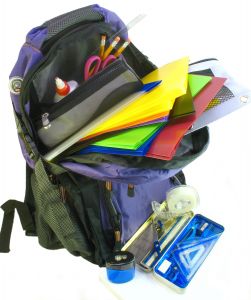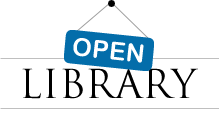Paper Doll Cleans Out Her Backpack: Book Lover Edition
School’s out, and the first step towards enjoying summer vacation is cleaning out the old overstuffed backpack.
(That’s not your first step? If there’s even a remote chance that there’s a half-finished tuna sandwich at the bottom of the backpack — trust me, do not pass GO and do not collect $200. Empty the backpack, purge whatever the 21st century equivalent of mimeographs might be, and save only the truly stand-out test papers or reports for archiving. If the backpack will go unused all summer, toss a fragrance-free fabric softener sheet inside before tucking the bag away for the summer.)

Paper Doll sometimes needs to clear out the blogging backpack. There are links and products and photos that pop up during the year that either don’t fit a particular topic, or arrive too long after a post has gone live. Today, we’ve got a mixed (book)bag of items to dump out and sort through so that we can enjoy summer vacation.
At the beginning of our “academic” year, a special six-part Paper Doll series focused on reducing book clutter through multiple methods, including:
Book Rentals for Grownups
Book Rentals for Kids
Trading Books Online
Libraries
Electronic Books
Audio Books
Since then, some worthy additions have come to light.
How many of your piles of books are filled with unlovable titles you ended up with because you judged the book by its cover or because the blurbs on the back made it sound appealing? When you’re in an actual bookstore, you can flip through a book to see if the writing style really appeals to you. If you’re like Billy Crystal in When Harry Met Sally, you can even flip to the back page:
Sally: Amanda mentioned you had a dark side.
Harry: That’s what drew her to me.
Sally: Your dark side?
Harry: Sure. Why? Don’t you have a dark side? I know, you’re probably one of those cheerful people who dot their “i’s” with little hearts.
Sally: I have just as much of a dark side as the next person.
Harry: Oh, really? When I buy a new book, I read the last page first. That way, in case I die before I finish, I know how it ends. That, my friend, is a dark side.
In a bookstore, it’s easy to flip through the pages and get that sample “ice cream” taste. But as more and more people buy both tangible and digital books online, it’s hard to be sure you’re really going to like the book.

Page 99 Test has a solution that might help keep those unfinished, unlovable books at bay. The site is based on the Ford Madox Ford quote, “Open the book to page ninety-nine, and the quality of the whole will be revealed to you.”
Once registered for a free membership, you gain access to page 99 of random books depending on the genre preferences you’ve selected. Read page 99, declare whether you’d turn the page, offer feedback to the writer as to why you would (or would not) keep reading, and use a sliding scale to state how likely you are to buy the book.
Once you submit your feedback, the site tells you the title of the book and the name of the author, whether it’s a traditionally published book, a self-published book or an unpublished 99th page submitted by an aspiring author. The site also shares how others rated the book and lets you read their feedback.
Page 99 Test gives readers the chance to peruse samples of writing, and in the cases of published works, increases confidence about decisions to purchase or reject books. Some authors (including those of self-published and unpublished works) provide their Twitter IDs or other contact information, so readers can follow writers they enjoy. And authors gain the chance for honest reader evaluations without having to suffer the indignity of seeing someone who panned their life’s work across the breakfast table or in the checkout line at Piggly Wiggly.
The idea is intriguing, but Paper Doll would truly love a site that provided the opportunity to read page 99 of any published book. Amazon’s “Search Inside” function is similar, but is not universally available, and you often get only the table of contents, index or foreword of non-fiction titles and the opening pages of novels. A 99th page seems a better way to gauge whether a book has more promise than merely a splashy opening.

Obooko is a new twist on the electronic book market. Most of the sources we’d previously covered handled books published or sold in mainstream venues. Obooko, however, provides an opportunity for new (as well as established) authors to self-publish and promote their books digitally, free of charges or commissions, to gain wider audience attention.
Writers often toil in obscurity, waiting for mainstream publishers to fall in love with their books, or they struggle with self-promotion via social networking and their own blogs to help get the word out. Obooko provides an additional opportunity for writers to develop a following by making their work not only available for free, but via an outlet where their titles share (online) shelf space with select known authors.

Obooko also gives writers the chance to get feedback and ratings, so an author could use the site as an “open-source” editorial and review board. Obooko provides step-by-step instructions for preparing titles for submission and even furnishes free genre-specific ebook templates for those who have nifty ideas about narrative but find the technical side of things, including formatting, a bit daunting.
The ebooks, in PDF form, are free of charge to readers, with no hidden fees or in-book advertising. Obooko offers titles in a wide range of fiction and non-fiction genres, though the non-fiction shelves seem a bit sparse at this time. All books are either protected by standard copyright or Creative Commons licensing, or are already in the public domain.
Membership is required, but free to both authors and readers. Register with your first name, email address, and a little demographic data, create a user name and confirm that you are over 13 years old. Obooko will send you a password, which you can then change to something eminently more memorable than a string of random letters and numbers.
Once registered, readers can easily surf the site by genre, and then click on a title to get a synopsis and general information. One click on a large “Download” button delivers a book directly to readers’ desktops.
Are the works great literature or best-seller-worthy non-fiction? That’s for readers to decide, title by title. Certainly self-published titles are going to vary in quality from the next as-yet-undiscovered gem to the kind of fiction even the most word-hungry reader might eschew. But it’s free, and when pennies count, or when you feel like you’ve read everything in the house and just want something new, Obooko has a window on the world of novel novels and nouveau non-fiction.

Open Library is a global initiative to create an editable library catalog of every book ever written. It’s a slow, laborious, volunteer project which already includes one million digitized, readable ebooks. For the rest of the collection, there are upwards of 20 million title (information) records in anticipation of the eventual availability of digital texts to match those records.
This spring, a group of 150 North American public and university libraries, led by the Internet Archive (the amazing people behind the famed Wayback Machine) heralded a collaborative program via OpenLibrary for lending more than 100,000 ebooks, primarily 20th century titles.
To participate, patrons of the participating libraries must open an account with OpenLibrary. Then, when visiting library branches, patrons may borrow up to five ebooks at a time and can keep each for a two-week lending period. Only one person at a time may borrow any particular book — by which I mean licensed copy, as there may be multiple licensed copies of any given title. There’s no need to “return” the ebooks — access just goes poof at the end of the borrowing period.
If they’re digital, why can’t you keep the books forever? And why can’t dozens, or even hundreds, of borrowers have the same licensed copy at the same time? Good questions!
Libraries need to purchase licenses for ebooks, just like individuals and companies purchase software licenses and can’t make unlimited copies. Otherwise, if an unlimited number of ebooks were made available, authors and publishers would receive dramatically reduced revenue and would be inclined to refuse to sell digital books to libraries at all, thus severely curtailing access to books that many readers would otherwise be unable to obtain.
Borrowers have the choice between two alternative versions of ebook formats. Select either an in-browser version, which can be viewed via the Internet Archive’s BookReader web application) or a PDF or ePub version through Adobe Digital Editions. Books may be read on users’ own laptops or devices (including iPads), or on public library computers, providing greater access to borrowers who may not own computers, thus eliminating some of the current digital literacy divide.
Readers who are not members of the initial 150 member libraries of this collaboration may still access close to 10,000 of OpenLibrary’s Open Lending collection.
Please join me next week as we continue to shake quirky but forgotten items out of Paper Doll‘s blogging backpack.




Follow Me